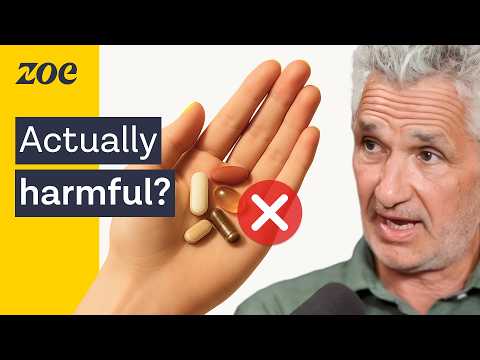## The Supplement Truth Bomb: Do Pills Really Improve Your Health?
The supplement industry is booming, promising miraculous health improvements with a simple pill or powder. But are these claims backed by science, or are we falling for well-marketed placebos? A recent YouTube video featuring Professor Tim Spector and Dr. Sarah Berry, leading scientists at ZOE, tackles this very question, unveiling surprising truths about the effectiveness – and potential harm – of common supplements. This blog post summarizes their key findings and helps you navigate the confusing world of dietary supplements.
### The Shocking Reality of Supplement Science
The video begins by challenging the very foundation of the supplement industry. Most supplements lack the rigorous scientific testing expected of medical treatments. Spector and Berry highlight the disparity between marketing claims and actual scientific evidence, emphasizing that many supplements simply don’t deliver on their promises. The post-war mindset of focusing on individual nutrient deficiencies, rather than the complex interplay of whole foods, is also addressed. This outdated approach, they argue, is a major reason why many people mistakenly believe supplements are the answer to poor health.
### Vitamin Pills: More Harm Than Good?
The discussion dives into the potential downsides of common vitamin pills. While acknowledging the historical importance of supplements in combating diseases like scurvy and rickets (due to severe deficiencies), they argue that in modern times, taking vitamin pills without a diagnosed deficiency can actually be counterproductive. The video cites research suggesting that excessive intake of certain vitamins, particularly through supplementation, can even be harmful. For instance, evidence links high calcium supplementation to increased cardiovascular risk. The conversation also addresses the practice of food companies adding vitamins to their products – often as a marketing ploy rather than a genuine health benefit.
### Beyond Deficiencies: The True Root of Poor Health
Spector and Berry shift the focus from individual nutrient deficiencies to the broader picture of diet and gut health. They argue that the problem with most people’s diets isn’t a lack of specific vitamins or minerals but rather a lack of diversity and abundance in whole, plant-based foods. They explain how processed foods and a limited diet negatively impact gut microbiome diversity, which is essential for overall health. Fixing a poor diet, they emphasize, is far more challenging than simply popping a pill.
### The Future of Supplementation: A New Approach
Recognizing the limitations of traditional supplements, the video introduces a novel approach centered on the gut microbiome. This involves a new type of supplement, which was tested in a randomized controlled trial (RCT) discussed in the video. The RCT showed that this new supplement, focusing on improving gut microbiome diversity, yielded significant improvements in several health markers, including cholesterol and inflammation levels, and even positively impacted mood. However, traditional probiotic supplements, while showing some benefits, were not as impactful.
### Plant Diversity: The Key to Gut Health
The video strongly advocates for a diverse diet rich in whole, plant-based foods. They highlight the crucial difference between consuming whole plants and isolated powders or extracts. The structure and complex interactions within whole plants are essential for promoting a healthy gut microbiome, unlike the limited benefits of isolated components. The researchers underscore the importance of plant diversity, demonstrating that a varied diet is far more effective than focusing on individual nutrients.
### Conclusion: A Holistic Approach to Health
The video concludes by emphasizing the importance of shifting away from a reliance on individual supplements towards a more holistic approach focusing on dietary diversity and gut health. While supplements can play a role in addressing specific deficiencies under medical supervision, they are not a magic bullet for good health. The new research highlights a potential path forward – supplements designed to support and enhance the natural processes of the gut microbiome – a much more nuanced and effective approach than simply adding isolated nutrients. The video’s compelling arguments and research findings make it clear: a balanced, diverse diet rich in whole plants remains the cornerstone of good health.


